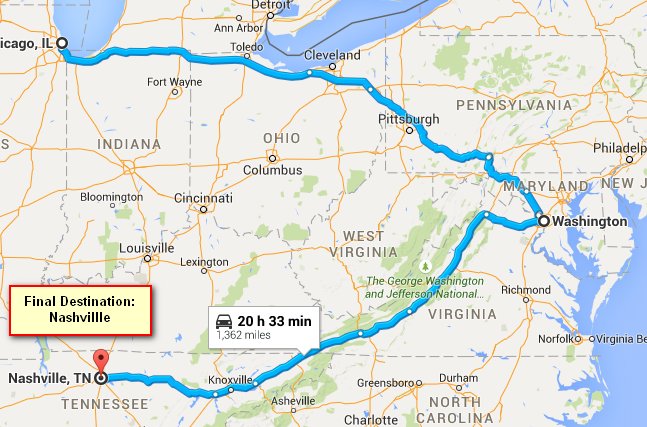
“What brings you to Tennessee?” That’s the question I’ve been getting lately, as my Chicago accent gives away that I’m not a Nashville native by any stretch of the imagination. I’ve graduated from the George Washington University, and instead of staying in D.C. to work on education policy at a national level, I packed my bags, moved away from friends and family, and relocated to Nashville. I made this move because I wanted work locally, closer to the communities and people that education reform actually affects. I wanted to learn from people that already had some success in education, but still had challenges ahead.
When I started looking at places to start my postgraduate path in education policy, Tennessee stood out among the others for the impressive academic improvements the state had experienced over the past five years. When you consider that in 2013, Tennessee was the fastest improving state in the national with strong strides in fourth grade math and reading based on results from the National Assessment of Educational Progress (NAEP) and that growth has continued over the past two year, Tennessee is a clear choice for a young graduate looking to learn more about effective education policy.
But before Tennessee began making its impressive progress, the state’s education track record was weak. Inflated claims about student proficiency earned Tennessee an “F” in truth in advertising in a national report in 2007. Instead of trying to place the blame elsewhere, Tennessee “owned that F” and used that bad news to turn around the state and seek out new ideas to combat the problems of low test scores. This type of turnout is not possible without a group of incredibly dedicated individuals working collaboratively in all areas of the education space. From teachers to policymakers, superintendents to school advocates, there are tens of thousands of people working in Tennessee education who are united in putting students first. The successes Tennessee has experienced in a short period of time and the constructive collaboration in the state have brought me here.
Although part of the reason I chose to get involved in Tennessee education policy was the strides in education, I’m also drawn to the challenges in Tennessee. Some challenges come from the geographic diversity in the state.
Growing up in Chicago, I attended a magnet high school and then going to college in D.C. allowed me to watch as schools systems experimented with alternative educational delivery systems from magnet to charter to traditional public schools. I also watched as both cities, Chicago and D.C., attracted new teachers, just based on the desirability of those locations.
Schools in rural areas have greater difficulty attracting new teachers than Chicago or D.C., and rural systems struggle sometimes with obtaining other essential resources for their students. Addressing these challenges will require innovation for the unique situation of rural schools. For example, expanding school choice might change a city or suburban school, but for rural schools, this shift does practically nothing. The denseness of cities have presented some particular problems and therefore, particular solutions have been created. But it is careless to apply those solutions to different places.
Cultivating and maintaining quality education should be focused not just in urban and suburban areas, but rural areas as well. This is an area of education that is underexplored and the opportunities for impact in Tennessee are another reason I chose to pursue my career here.
Tennessee is a definitely not a “one-size-fits-all” state, when it comes to K-12 education, but I do think that many people in the state are unified around important goals for their students: high standards complemented with an aligned assessment, great teachers, strong school leadership, and the continued use of data and technology in schools. With these four things in mind, policy will adapt to make sure that students in the state, no matter where they live, can get a good education.
What brings me to Tennessee is the desire to listen and learn from educators, policymakers, parents, and students about how to provide a quality education for each child in Tennessee. Tennessee has made tremendous strides and still has room to grow. I hope to learn from the successes of others and be part of the change in this state.
